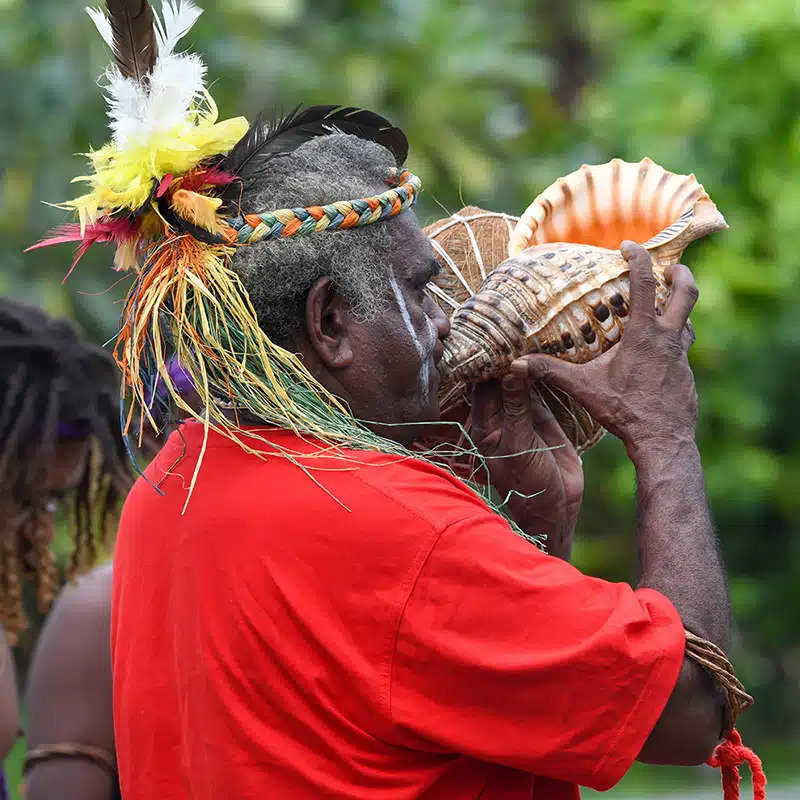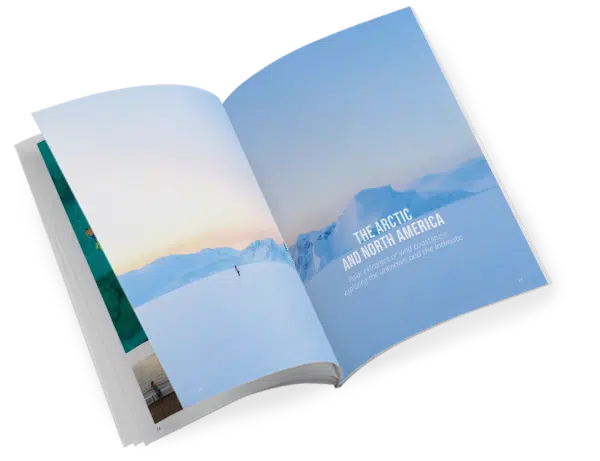The power of customs
A trip to New Caledonia is more than the Great Barrier Reef, beaches and lagoons. It also means meeting the Kanak. The Kanak are naturally restrained with a simple and authentic way of life, but once they trust you, they will leave you forever transformed.
The “human beings” of New Caledonia
The Kanak are an indigenous Melanesian population located on a few islands in New Caledonia, to the east of Australia in the South Pacific. The word “Kanak” comes from the Hawaiian word “kanaka”, meaning “person”, “human being”, or “free person”. The Kanak came from Borneo and the Philippines in 1500 BC and now make up the majority of people in the Northern province (72.2%) of Grande-Terre, the archipelago’s main island, and in Lifou, Maré and Ouvéa in the Loyalty Islands Province (94.6%). Despite the modernisation of society, traditional Kanak culture is still very present and highly respected in New Caledonia. It is a plural culture for a “one and indivisible” people who speak 28 different languages and are split into 330 chiefdoms.
When nature rhymes with culture
Faced with the essential challenge of preserving ecosystems, New Caledonia is playing a leading role in the Pacific region, driven by a mixed population that is highly concerned with protecting its land and ocean. The links uniting the inhabitants of New Caledonia and nature are powerful: the word “nature” does not exist in the Kanak languages. It merges with “culture”, stretching from the mountain to the river, to the reef and to the invisible world beyond.
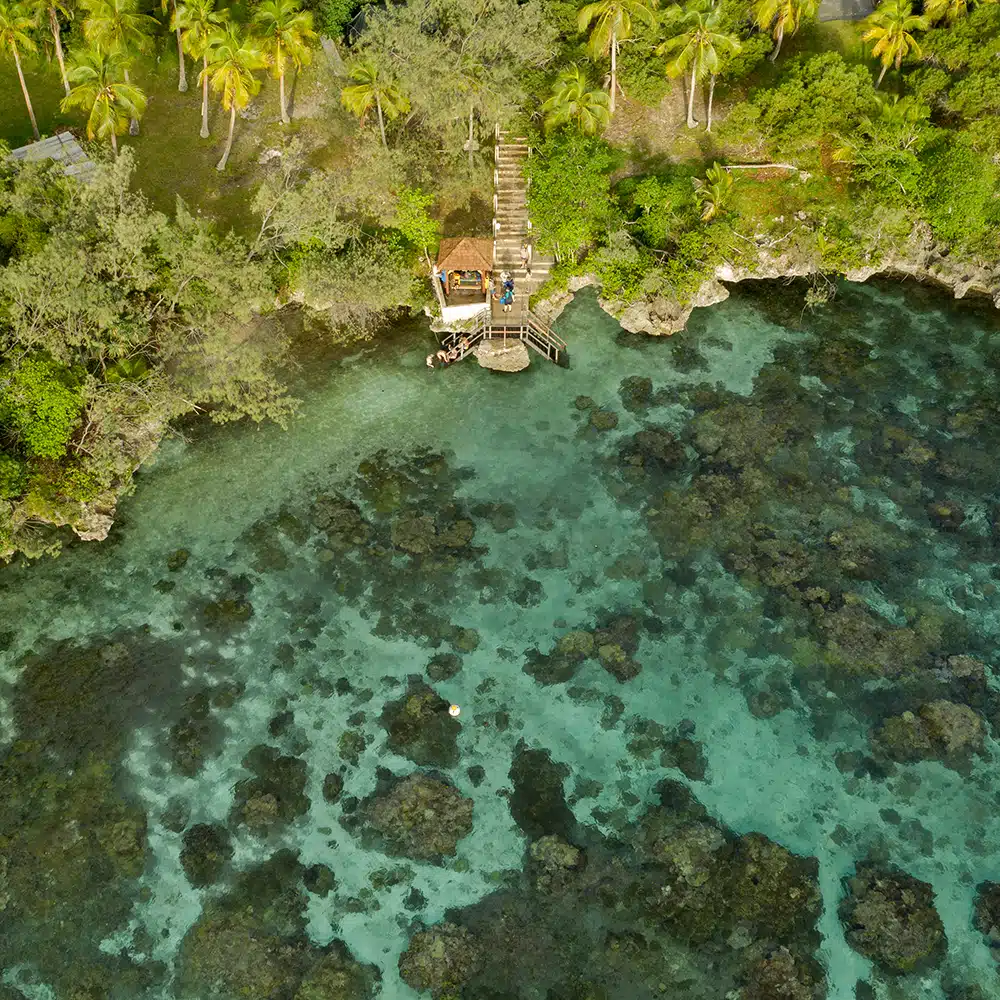
“Customs”: the traditional binder of a diverse yet indivisible people
Omnipresent and legally binding for the Kanak, customs are the foundation of the Melanesian social bond. They are a passport to understanding Kanak culture. “Customs” mean all the unwritten rules governing the social balance of indigenous New Caledonians, genuine “customary laws” parallel to French law. These rules punctuate the stages of life (birth, marriage, mourning, alliances, harvests, etc.), define duties and obligations towards the community and dictate each person’s place, respect for the elders and connection to the land and the sacred. The entire Kanak society is structured around this sacred land, with the clan at its core. And at its head, the Grand Chef (Great Chief) is responsible for upholding traditional customs. At the heart of each clan is the Kanak Grande Case, “the social centre of the tribe”, equivalent to the Māori wharenui. Once the Grand Chef’s home, it is now used for gatherings, discussions and meetings.
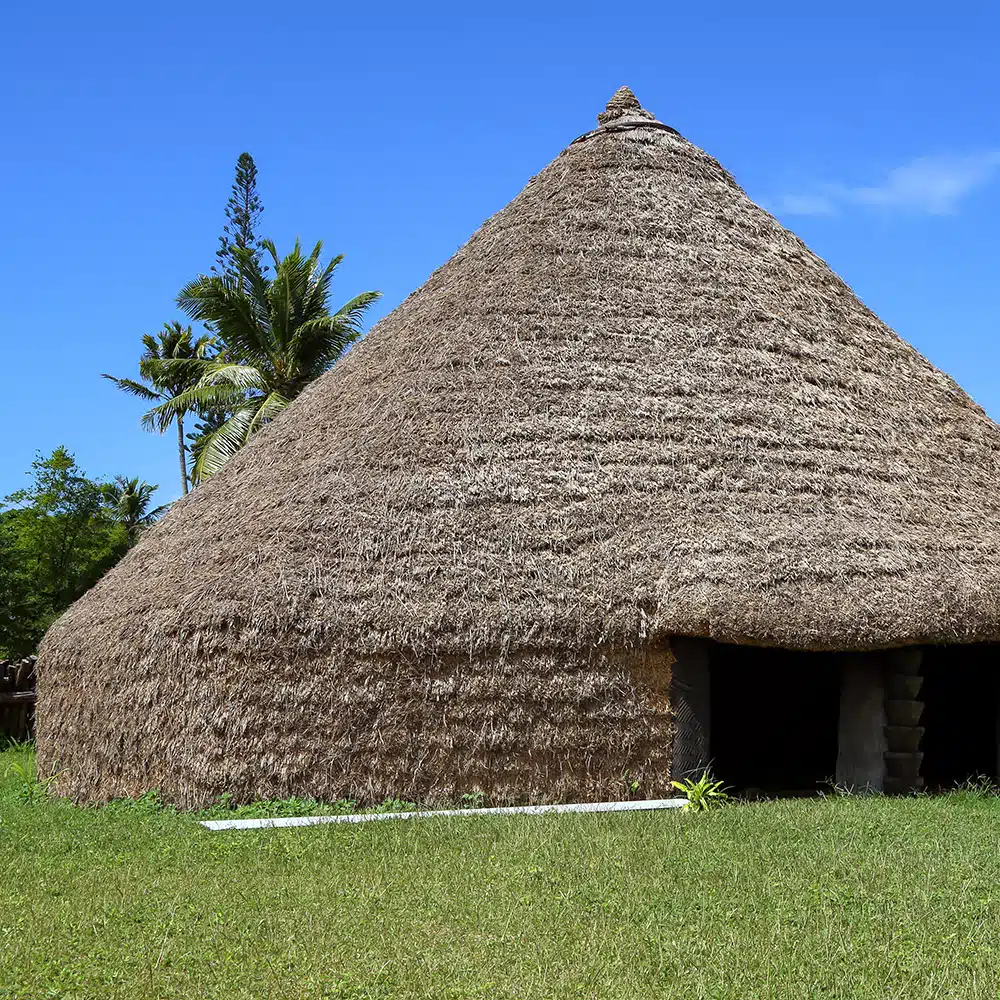
“Faire la coutume”
Just as the Māori of New Zealand have the Powhiri, an ancestral welcome ritual, the Kanak of New Caledonia may ask you to “faire la coutume”, a mandatory rite of passage before being welcomed into the village. This involves the clan chief and their guest giving each other reciprocal offerings. You must introduce yourself with a symbolic present wrapped in a small piece of cloth (manou) as a sign of respect and humility. For example, you can give them a few CFP francs, a packet of rice or tobacco. These serve as “modern” substitutes for traditional customary exchanges of yam or Kanak “currency”: a strand of wool decorated with flying-fox bones, shells or whale teeth, a symbol of the ancestors and the clan. The chief will respond with a counter-gift and a few words of welcome before inviting you to enter their land among their people. ]
Taste the Kanak sweet life
After this customary greeting, you are warmly welcomed and allowed to share the daily life of the tribe – a daily life that flows to the rhythm of hunting, fishing… and yams. Once the perfect gift in customary exchanges, yams continue to play a central role in the culture of the Melanesian people. A staple food before the arrival of Europeans, this sacred tuber remains a symbol of manhood, honour, seniority and power. The cycle of planting and harvesting yams sets the pace of life for the clan.
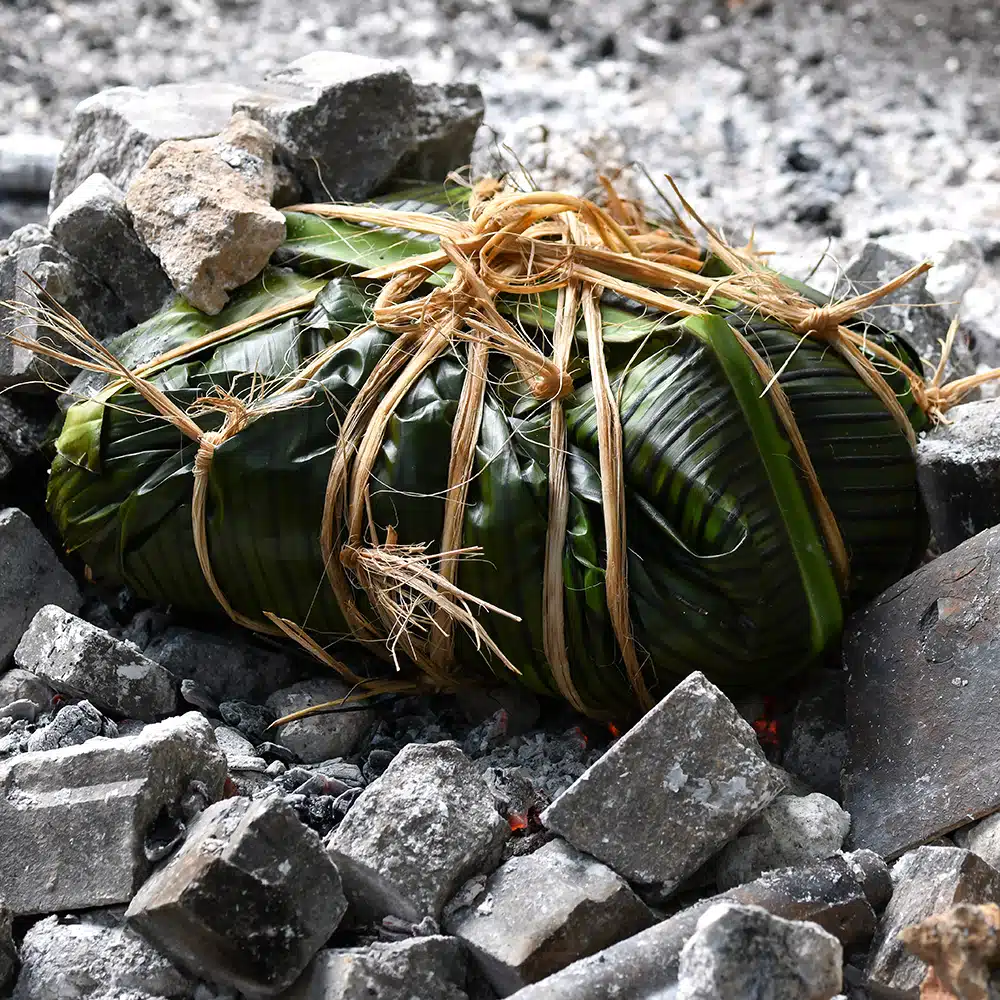
Bougna, a traditional dish
Yams are one of the main ingredients of bougna. This traditional dish is a type of meat or fish stew involving vegetables such as taro, sweet potato, plantain, tomato… and yams. These ingredients are covered with boiling coconut milk, wrapped in a large banana leaf and patiently stewed in a hot stone oven. A whole ceremony for a dish designed to be shared! ]
Another must-try New Caledonian institution is kava, a bitter drink made from pepper roots with a liquorice flavour. The beverage has relaxing and beneficial properties – effects that the Kanaks call the “kava song”. If you’re curious, take a kava break in a nakamal, a traditional little hut sometimes indicated by a yellow or red light. Regardless of their peoples and social classes, Kanak, Caldoche (Caledonians of European origin), mainlanders, Wallisians and Futunians like to meet there at the end of the day to relax and “raise a shell”…
During your trip to New Caledonia, learn to live alongside and at the (peaceful) pace of the Kanak and to follow and understand the traditions of this natural and authentic people, respectful of their history, ancestors, culture and precious customs.
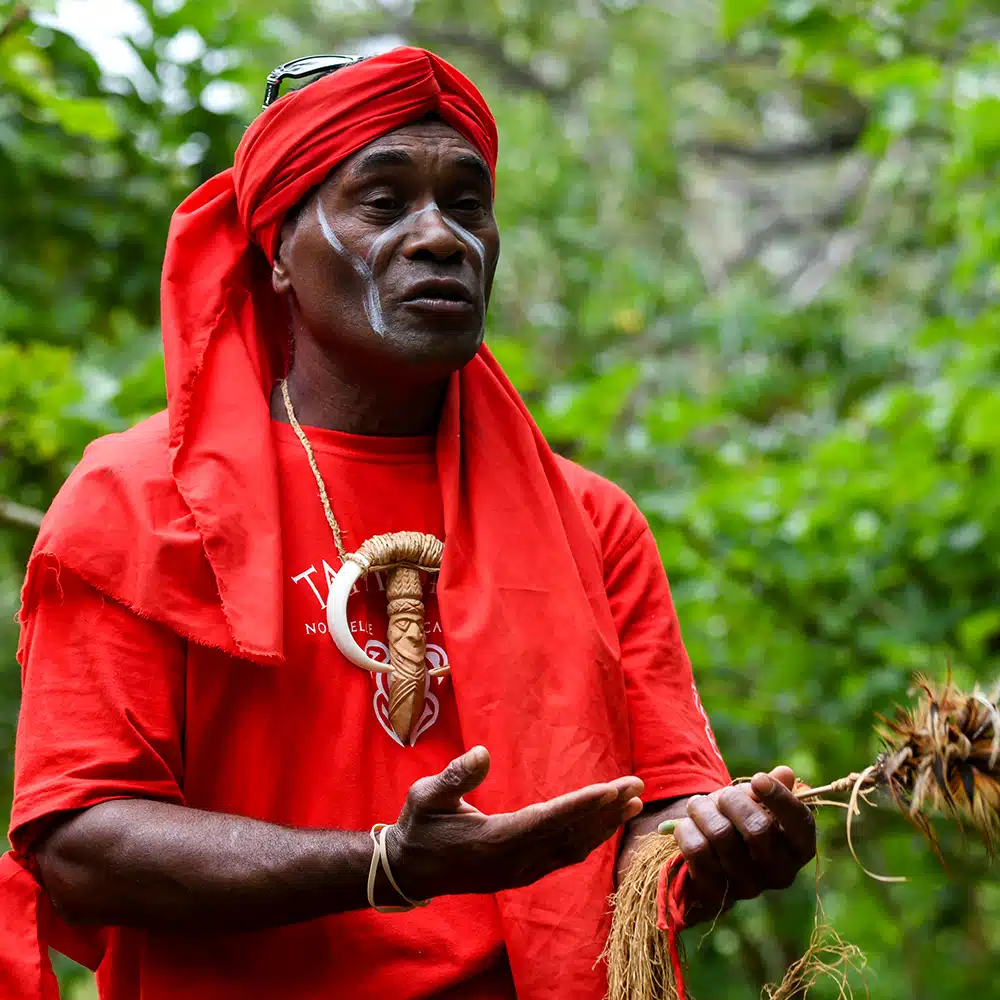
New Caledonia facts
Nickname: “Le Caillou” (pebble), “Kanaky” or “Pays” (country)
Capital: Nouméa
Population: 271,030 inhabitants (2021)
Languages spoken: French + 28 Kanak and other vernacular languages
Area: 18,519 km²
Density: 13.2 inhabitants/km² (Nouméa: more than 2,100 inhabitants/km²)
To prepare for your trip
Read…
Jean-Marie Tjibaou, Kanak Witness to the World: An Intellectual Biography, Eric Waddell
Kanaké: The Melanesian Way, Jean-Marie Tjibaou
Coutume kanak, Sébastien Lebègue
Cannibale, Didier Daeninckx
And watch…
Rebellion, Mathieu Kassovitz
Kanak, l’histoire oubliée, Stéphane Kappes
Photo credits: ©Studio PONANT / Laure Patricot
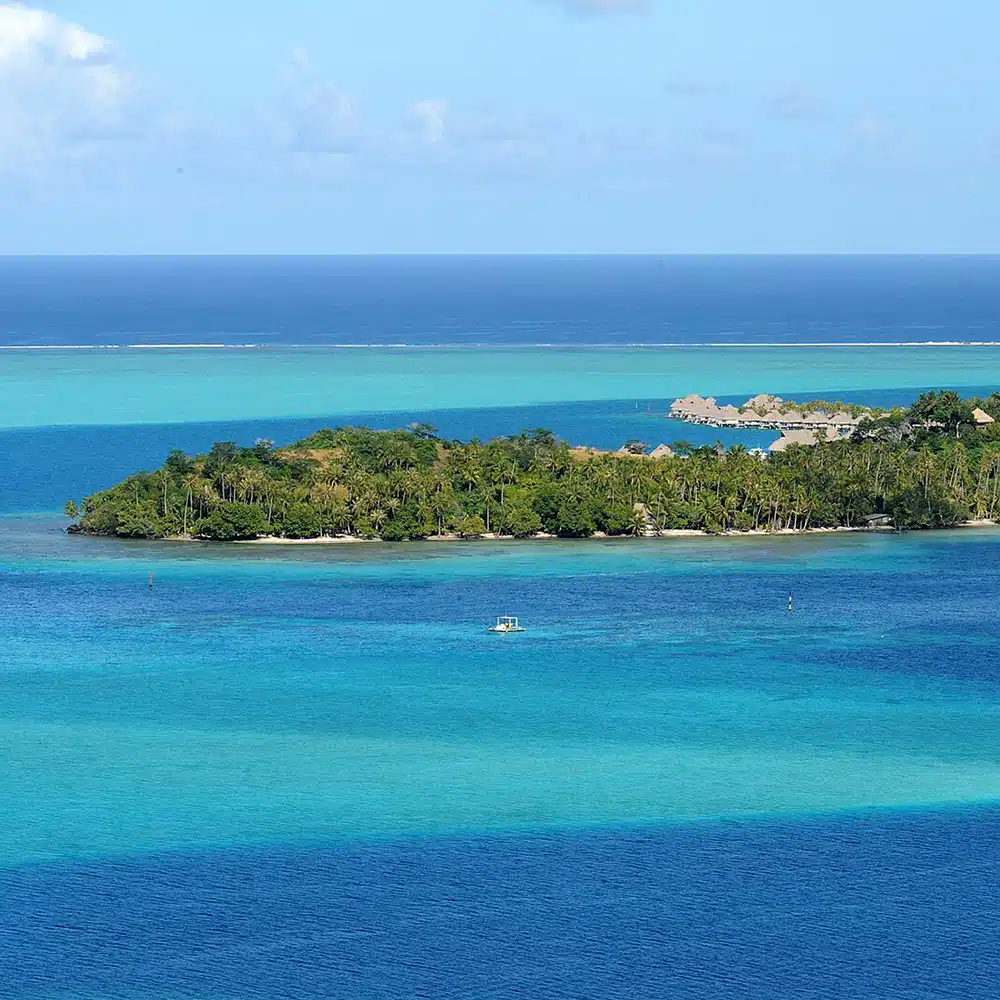
PONANT takes you there
Discover the wisdom of people at the ends of the earth

